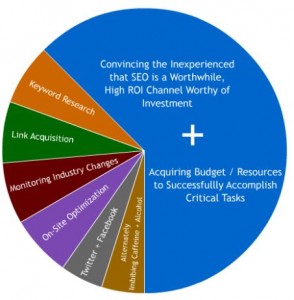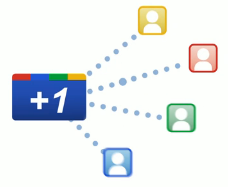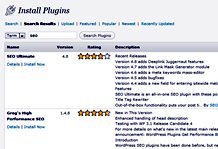Posts Tagged ‘seo’
Description of ‘seo’ Tag:
Thursday, August 23rd, 2012
The Land of the Penguin, Everything is Black and White
Over the past year or so, Google has pushed some major changes in the form of an algorithmic update called Penguin (and just before it, another called Panda) that had a pretty single-minded purpose; to draw a line in the sand and call everything on the wrong side of the line ‘black’. Penguin actually changed almost nothing about the rules of good website marketing (though Panda did) — Penguin’s (very nearly) single purpose was to punish specific kinds of link-building behavior.
Google refers to the links it punishes as “questionable”. According to the law of the Penguin, a “questionable” link is one that:
- Has anchor text that is an exact match to the anchor text in the majority of your incoming links, particularly if the content that is linking is low-quality content.
- The link comes from an auto-approve, non-moderated blog — again, particularly if the content on that blog is of lower-than-average quality.
- OR, the link comes from a web site that has a significant number of outgoing links and no real traffic to speak of. (BuildMyRank, anyone? BuildMyRank deindexed)
These things seem relatively banal and minor, but if you’re a Search Engine Optimization (SEO) wonk, you’re already wincing. You can see between the lines that most links that may have been the SEO-baseline before Penguin are now out:
- Autoblogs? Nope.
- Site directories that few people use (i.e. a lot of them)? Useless.
- Even ubiquitous SEO toolbox items like optimizing for a specific keyword on each page got hit
- now you must spread your keywords around on every page or you’re flirting with the Google sandbox.
Paradigm Shift
The result of the Panda / Penguin double-punch has been profound across the field of SEO. It’s no longer about ranking as high as you can, as quickly as you can. It’s not even about deep research into your competitor’s backlink structure so that you can out-backlink them in an Olympic-style speed-back-linking event. (If you did SEO… Read the rest
Tags: Google, google penguin, seo
Posted in Google, Search Engine Optimization SEO | 2 Comments »
Monday, August 6th, 2012

Not that long ago, it wasn’t all that difficult to optimize a website for a search engine. Before there was Penguin or Panda, there was color. Or rather, there were shades of gray – areas that weren’t quite white-hat but weren’t black-hat enough for Google to penalize you for using them.
SEO wasn’t easy, per se, but it was easier.
The rules were more simple:
- Post decent content.
- Optimize your content for high-traffic, low-competition keywords with selling connotations.
- Don’t use obvious black-hat techniques like link-bombing.
- Build backlinks to your website. The more the better.
- Pack your keywords as dense as Google will let you (about 2% for most niches).
There were obviously details for each of these rules, but by and large, you could become an ‘SEO expert’ in a matter of weeks if you dedicated yourself to learning them. It might take a while to actually optimize a website, but it could actually be done by a single person working just a little overtime full time for a few weeks.
The most difficult parts of ‘old style’ SEO were producing content, some folks even outsourcing to writers off shore, like in India and the Philippines that spoke (or rather wrote) English just well enough to get Google to understand what they intended their topic to be. You could outsource an article overseas, and while with most of this content any English-speaking human that read it would laugh and click away, the search engine spiders didn’t mind the off syntax, so it worked.
Link-building was largely a matter of using automated systems that could mass-produce backlinks for you and hiring more outsourced link-builders to create those links that couldn’t be automated. SEO companies in the US often did the ‘hard’ work of producing quality content – the pieces that you expected people to read and that you put your company logo on – while they outsourced other content.
Then along came Penguin and before that its older brother Panda, and everything changed. Since we’re going to focus specifically on the Penguin update next week, let’s do a little bit of ‘in-between’; the… Read the rest
Tags: seo
Posted in Google, Search Engine Optimization SEO, Search Engines | 2 Comments »
Friday, November 11th, 2011
In any type of business there is always competition, some industries just face more of it than others. If you are like most people then you probably have a hard time dealing with the stress brought on by your competitors. If you feel this way about competition it is completely normal but if you know how to use your competitors to your advantage you can almost always turn this into a positive feeling. Competition isn’t all bad because it helps us to better ourselves or our business because it plays off our relentless desire to be the best that we can be.
 With Search Engine Optimization the goal is to have your website ranked the highest and receive the most traffic or conversions. Being the most prominent and relevant website is crucial to the success of most businesses. The competing websites that you encounter when performing your SEO may seem like a bad thing, however they can almost always assist you in making better internet marketing decisions. It may seem sneaky to spy on your competitors but it has become a common practice and competitive analysis is a crucial component to website marketing. Knowing who your competitors are and how they are conducting their SEO can provide you with some very valuable marketing data. Below is a short list of how you can benefit from exploring the trends and movements of the top competitors for yours or your client’s website. With Search Engine Optimization the goal is to have your website ranked the highest and receive the most traffic or conversions. Being the most prominent and relevant website is crucial to the success of most businesses. The competing websites that you encounter when performing your SEO may seem like a bad thing, however they can almost always assist you in making better internet marketing decisions. It may seem sneaky to spy on your competitors but it has become a common practice and competitive analysis is a crucial component to website marketing. Knowing who your competitors are and how they are conducting their SEO can provide you with some very valuable marketing data. Below is a short list of how you can benefit from exploring the trends and movements of the top competitors for yours or your client’s website.
Social Media:
Social Media is probably the easiest place to start. Check out what social networking sites that your competitors are using and see which ones would be beneficial to your website. In addition see how they are using these sites to communicate with their audience and what type of content they offer on their social pages. Identifying how your competition is using these platforms is a great way to get an idea of what people like, what they don’t like, what is successful, what isn’t successful, and what you can be doing that they aren’t.
Meta… Read the rest
Tags: backlinks, competition, competitors, competitve analysis, Internet Marketing, keywords, seo
Posted in Internet Marketing, Search Engine Optimization SEO | 7 Comments »
Thursday, October 13th, 2011
Updating a website refers to the addition or modification of content as well as the actual design and layout of the website. Stale websites can quickly discourage web visitors and are one of the major reasons behind high bounce rates. A bounce occurs when a visitor quickly views the page that they have landed on and then decides to leave the site rather than exploring its other web pages. 
How often should you be updating your website:
So, how often should you be updating your website? There aren’t any set expectations for how often a website should be updated. However it is suggested that you perform updates as frequently as possible in order to prevent your website from looking dated and losing your valuable web traffic. It is recommended that you try to update your website at least 1 to 2 times a month. These weekly or monthly updates should be designed for only adding or refreshing content unless the entire website’s design is fatigued. As long as you develop a site that is both visually appealing and easily accessible then your primary updates should focus solely on your content.
When asked, most webmasters and search engine marketers agree that the more you update your content the more impact it will have on your Search Engine Optimization. Updating is especially helpful when it comes to blog content. Continuously adding new blog posts leads to more of your pages being indexed and draws in more visitors and potential customers.
Reasons for Updating Your Website:
- Updating provides your visitors with a visually appealing user experience.
- Updating your website establishes fresh and relevant content.
- Updating helps your website get indexed more often.
- Updating attracts new traffic.
- Updating increases rank and influences other websites to link to your website.
Tips for Updating Your Website’s Design:
… Read the rest
Tags: content, Design, seo, update, website, website content, website design
Posted in Web Development, Web Hosting, Web Tips | No Comments »
Friday, September 2nd, 2011
What is an Infographic? An infographic is a pictorial representation of specific data or knowledge. Infographics can be a great way to showcase information on a particular subject area and can prove to be a good source of link value. Infographics have the ability to transform plain material into interesting and exciting web content. Over the past few years the value of infographics has grown tremendously because many have begun to recognize the potential they have to connect with their target audience.

from http://www.seomoz.org/blog/4-essential-seo-infographics, September 2011
Link value or link juice is a term often used in Search Engine Optimization and refers to the amount of value that the search engines like Google attribute to a website or link. Link juice is assigned to web pages and is dispersed throughout a website based on how well your website is optimized. The more links and most importantly the more high quality links a website has directly translates into the more link juice a website is likely to have.
When talking about Links it is important to understand some important fundamentals. Total links quantity indicates the total number of links that your website or webpage possesses. The merit of these links can vary which brings us to the linking source. The linking source describes who is linking to your content and how credible or trustworthy they are. The sites that have a higher rank will pass on more value than those with a lower web rank. Even though the websites with a higher rank may provide more value it is also important to have diversity among your links. It’s ok to have links from lower ranked pages as long as there is a balance between link values.
Another major factor with links is anchor text. The anchor text is the keywords and descriptions other websites use when linking to your content. Accurate anchor text is essential for good SEO. You want something that describes your content well and not something like “Click… Read the rest
Tags: anchor text, backlinks, content, infographics, link juice, link value, linkbait, Links, seo, seo infographics
Posted in Backlinks, Internet Marketing, Search Engine Optimization SEO, Social Media Marketing | No Comments »
Friday, August 26th, 2011
One of the most important elements of creating a website is selecting a proper domain name. A domain name is commonly part of a larger Internet address called a “URL”. Having the right domain name for your website can significantly help establish an online reputation and generate greater visibility. Domain names give both the human visitors as well as the search engines the first description or impression of the website. Choosing a domain name can often be just as important as deciding the name of your business and should not be taken lightly. Finding a successful domain name will require time, patience, and creativity. The following tips are designed to assist in creating successful domain names.
Best Practices for Creating a Domain Name:
- Describe Your Website by Matching Your Domain, Website, and Company Name
A domain name is one of the first elements of a website that visitors see. Matching your domain with your company name will help target your existing as well as potential customers. Having a company and domain that describes your website will also let people know what the website is about and draw in targeted traffic. For example with the domain www.DeliciousPastries.com Delicious Pastries is the company name, website name, domain name, and also highlights Pastries a major descriptive keyword.

- Keep it Short and Readable-
There are several incentives for keeping your Domain name short which include it being easy to type, easy to remember, and easier to travel by word of mouth. A domain name that is longer than 3 words should use hyphens. However a domain name with more than 3 words and hyphens will raise the websites level of spamminess.
Having a keyword in your domain name will help rank not only because it is part of your domain but also because it is the anchor text that others will use to link back to your website.
- Alternative Domain Top Level Domains (TLD)
It’s recommended that you only purchase the .Com version of your… Read the rest
Tags: domain, domain names, internet, keywords, seo, url, urls, website
Posted in Internet Marketing, Search Engine Optimization SEO, Web Development | 1 Comment »
Friday, August 19th, 2011
One of the most important and easiest Search Engine Optimization concepts is keyword placement. SEO Keyword placement refers to the integration of targeted keywords into locations on and off the webpage. Keywords or key phrases are generated to represent the terms that users search for when trying to locate your company and website. A website using the wrong or inaccurate keywords is as equally bad as a website that ignores keywords all together.

Keyword Cloud
Having accurate and descriptive keywords however is only the first part of the equation. Once you establish a list of relevant keywords they then need to be strategically placed throughout the website in order to increase traffic. Each individual page of your website should be optimized for one to three unique keywords. Selecting keywords along with the placement of these keywords is crucial in order to increase your website’s visibility and guide targeted traffic directly to your website. Below are the 10 most important positions to consider when performing keyword placement.
Where to Use Keywords:
It is recommended that you always place your keywords near the beginning of the title tag. Not using your keywords in the website’s title tag can make it extremely difficult to rank for your targeted keywords. Keyword placement in the title tag is thought to be the most important search engine ranking factors, each page title should be unique to that page and optimized for that specific keyword.
Although the Meta Description Tag seems to play a very little role in the actual search engine ranking it can still be used to influence potential customers to visit your website. Any keywords that your description tag has in common with the search query will appear bolded in the Search engine results page (SERP). Similar to the title tag each page should also have a unique description tag that targets only 1-2 keywords.
… Read the rest
Tags: Internet Marketing, keyword, keyword placement, keywords, Links, search engine, seo, website
Posted in Internet Marketing, Search Engine Optimization SEO, Web Tips | No Comments »
Wednesday, August 3rd, 2011
Most people can agree that social media has drastically changed the way businesses perform online marketing. Social media sites like Facebook and Twitter have provided businesses with the resources to create detailed portfolios and interact freely with their customers. Some companies even believe that Search Engine Optimization (SEO) is no longer important and social media should be their main focus.
Does SEO still matter? Social media sites have done a great job of connecting businesses with customers. However even with all the advantages that social media has to offer it shouldn’t replace SEO. Instead social media websites should be thought of as a complement to SEO rather than its substitute.
There are many benefits to using social media like attracting new clients, staying in contact with clients, and the ability to build a positive reputation. It’s clear that due to its popularity social media has begun to push other key SEO elements into the background but that doesn’t mean those elements are not still important. As important as Social media is it remains only one portion of the SEO puzzle. The following is a list of reasons why SEO still matters.
1. SEO Finds The People That Want to Find You!
Social networking will put you in front of other social media users but that doesn’t mean they are customers. With SEO you have a better chance of being found by buyers. Social media is often used to communicate with users that are already part of your circle whereas SEO can be used to draw in users to your circle.
2. SEO Provides More Relevance to Customers!
Social media can increase awareness of your company but with Search Engine Optimization you can specifically target customers seeking your product or service. SEO helps you rank for relevant searches which increases the chance of conversion. Additionally each keyword can be optimized to target a different group of consumers.
3. SEO Enhances The Conversion Process!
As mentioned, SEO focuses more on increasing the chances of conversion. SEO focuses on streamlining the conversion process. Every step… Read the rest
Tags: Internet Marketing, marketing, media, search engine optimization, seo, social, Social Media
Posted in Internet Marketing, Search Engine Optimization SEO, Social Media Marketing | No Comments »
Wednesday, June 8th, 2011
Back in March Google began rolling out their +1 feature locally on their Google results page. The new feature enables users to activate the Plus 1 button when they wanted to recommend a website to other users. Since Facebook did not want to have their Like Button located on the Google search results page and chose to showcase it on Bing instead, Google has taken action and created its own way to boost social interaction. Similar to the Facebook Like Button, the plus 1 feature lets users put their stamp of approval on a website.

From http://www.google.com/+1/button/, June 2011
Exactly one week ago on June 1, 2011 Google announced that they are now offering the +1 button to website developers to place on their own content. On the day of the announcement the +1 buttons started appearing on major websites like Bestbuy.com, TheHuffingtonPost.com, and Nordstrom.com. After only a week the button now appears on large and small websites all across the Internet. Websites can display the button and enable people to recommend their website, blog or even individual products. Already the Google +1 feature seems to have a solid foundation but it continues to work towards being as widely used as its Facebook counterpart. From what we can tell here at Internet Beacon, the Google +1 button is being used frequently on the search results page but doesn’t quite yet have the exposure necessary to properly compete with the Facebook and Twitter sharing buttons that are on individual websites. In time this could change drastically, after all the button is only a week old.
It makes sense that Google would eventually assign some sort of values to this feature where the more plus ones a website has would equal a rank better, however it is still unclear how this development will affect SEO and the Google website ranking algorithm. Google could determine that sites who… Read the rest
Tags: +1, Google, Google Plus 1, search engine, Search Results, seo, social networking
Posted in Search Engine Optimization SEO, Search Engines, Social Networking | No Comments »
Friday, February 18th, 2011
 WordPress is a web-based software that allows users to create and manage websites and blogs. The open source structure enables people from around the world to contribute to and maintain their WordPress website whether on WordPress’ web server or installed on their own web server. Although WordPress initially began as a blog tool it has developed into something so much more. By utilizing plug-ins, widgets, and themes users have the opportunity to fully customize their experience. A plug-in is software that can be added to existing software, like WordPress, which adds a new specific capability to the larger software application. For a full list of WordPress product features visit WordPress Product Features. WordPress is a web-based software that allows users to create and manage websites and blogs. The open source structure enables people from around the world to contribute to and maintain their WordPress website whether on WordPress’ web server or installed on their own web server. Although WordPress initially began as a blog tool it has developed into something so much more. By utilizing plug-ins, widgets, and themes users have the opportunity to fully customize their experience. A plug-in is software that can be added to existing software, like WordPress, which adds a new specific capability to the larger software application. For a full list of WordPress product features visit WordPress Product Features.
There are over thirteen thousand plug-ins available for the WordPress software making it extremely easy to tailor it to your specific uses. The following are some useful SEO plug-ins that the WordPress open source community has provided.
All-in-one SEO plug-ins such as WordPress SEO and SEO Scribe are designed to perform overall multiple SEO tasks that include optimizing content faster, providing great keywords, maintaining reader engagement, constructing quality links and increasing traffic! Most of the all in one SEO plug-ins operate similarly and perform similar functions. The following are among the most utilized all-in-one SEO WordPress plug-ins:
Below is a list of related, individual plug-ins that can be helpful in improving your blog or website’s Search Engine Optimization and enhancing Social Media Marketing:
AddToAny Share/Bookmark/Email:
AddToAny creates a customizable panel that showcases social networking sites. It makes it extremely easy and convenient for a visitor to submit to any social networking sites. The share menu organizes the social media sites according to most visited.
SEO Friendly Images:
The SEO Friendly Images WordPress plug-in automatically adds the “ALT” and “title” attributes to any images on your
… Read the rest
Tags: Blog Hints, link, plug, plugins, search, seo, site, title, Wordpress, wordpress plug ins
Posted in Blog Hints, Internet Marketing, Search Engine Optimization SEO, WordPress | No Comments »
|